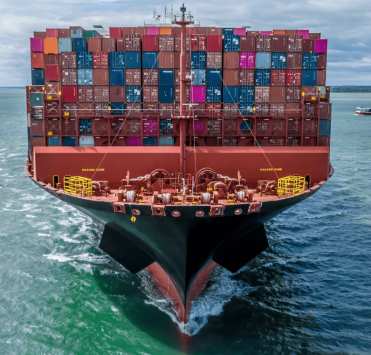Advantages of outsourcing logistics services: why businesses need logistics outsourcing

Modern companies operate in an environment of fierce competition, highly dynamic markets, and constantly growing customer demands for quality and speed of service. In such circumstances, the need for effective management of logistics processes comes to the fore.
Businesses are increasingly turning to logistics outsourcing, entrusting transportation, warehousing, and customs clearance to professionals. A logistics company that provides outsourcing services becomes a reliable partner, especially when it comes to international transportation and managing complex supply chains.
In this article, we will look at the main advantages of logistics outsourcing, analyze the benefits for business, and tell you how to choose a reliable logistics partner.
What is logistics outsourcing and why is it necessary for modern business?
Logistics outsourcing is the transfer of all or part of logistics functions to an external contractor, a specialized logistics company. In practice, this means that the business is freed from the need to independently manage transportation, warehousing, cargo handling, and paperwork. Instead, these processes are taken over by a professional logistics company that has the necessary resources and experience.
There are different models of logistics outsourcing on the market:
- Full logistics outsourcing. All functions, from transportation to warehouse management and document flow, are performed by the contractor.
- Partial logistics outsourcing. The business outsources individual functions, such as transport services, warehousing, or customs clearance.
Outsourcing is particularly important for companies involved in international transport, where logistics errors can lead to delivery delays, fines, and losses.
The main advantages of outsourcing logistics services
Reduction and optimization of logistics costs
Working with a professional logistics company allows businesses to save significant amounts of money. You don't need to:
- maintain your own fleet of vehicles and warehouses;
- invest in expensive software;
- hire and train logistics specialists.
All this is taken care of by your logistics partner, who already has well-established processes and modern resources. The effect is especially noticeable in international transportation, where the cost of mistakes can be high.
Improved quality of international transportation
Outsourcing logistics services helps companies engaged in foreign economic activity to improve the accuracy and reliability of deliveries. A logistics company specializing in international transportation provides:
- competent route planning taking into account the characteristics of different countries;
- professional customs clearance;
- minimization of downtime and delivery disruptions.
This has a positive impact on the image of the business and customer satisfaction levels.
Flexibility and scalability of logistics
Modern markets are dynamic: sales volumes can fluctuate depending on the season, geography, or external economic factors. A logistics company that provides outsourcing services can easily adapt to new conditions. This is especially important for those involved in international transportation, where demand can vary from country to country.
Your business gets the opportunity to scale without investing in new warehouses, transport, and technology — your logistics contractor takes care of that.
Access to professional technologies and experience
By working with an experienced logistics company, your business gains access to:
- modern supply chain management systems (TMS, WMS);
- real-time cargo tracking technologies;
- the best global practices in logistics and international transportation.
Developing such systems in-house would take years and require significant investment. Outsourcing transportation services and warehouse logistics solves this problem without additional costs.
Risk reduction
By outsourcing logistics, a company delegates some of the risks to the contractor:
- risks associated with delivery delays;
- responsibility for the safety of cargo;
- legal risks associated with international transport and customs clearance.
This is especially valuable when organizing international shipments, where strict compliance with the laws and regulations of different countries is required.
Focus on core business
By outsourcing logistics management to professionals, a company can focus on developing its core business: creating new products, marketing, and sales.
All logistics tasks — from transport management to organizing international shipments — fall on the shoulders of your logistics contractor.
Who is logistics outsourcing suitable for?
Logistics outsourcing is in demand in many industries:
- Manufacturers focused on export and international transportation.
- Companies with an extensive network of branches and representative offices.
- Online stores and marketplaces that handle large volumes of orders.
- Distributors that deliver to several countries.
How to choose a reliable logistics partner for outsourcing
To ensure successful cooperation, it is important to choose the right logistics company. Pay attention to:
- experience in organizing international transportation;
- own fleet of vehicles, warehouse space, and a developed network of partners;
- IT solutions used for logistics management;
- customer reviews and reputation in the market;
- willingness to enter into a transparent contract with clear KPIs and SLAs.
Risks of logistics outsourcing and ways to minimize them
Despite all the advantages of outsourcing logistics services, businesses should consider the possible risks:
- loss of operational control over logistics;
- dependence on the reliability of the contractor;
- possible hidden costs when changing the terms of cooperation.
How to minimize these risks:
- choose a logistics company with a proven reputation;
- specify key parameters of work and responsibility in the contract;
- conduct regular audits of the logistics contractor's activities;
- do not limit yourself to one partner for all international shipments — distribute tasks among several providers.
Conclusion: outsourcing as a strategic business tool
Outsourcing logistics services is not just a way to save money. It is a strategic tool that allows businesses to:
- reduce costs;
- increase the flexibility and manageability of logistics processes;
- minimize risks in international transportation;
- improve customer satisfaction through high-quality service.
The modern logistics market offers a variety of solutions for any task. The right logistics company becomes a reliable partner in business development and successful international operations.









